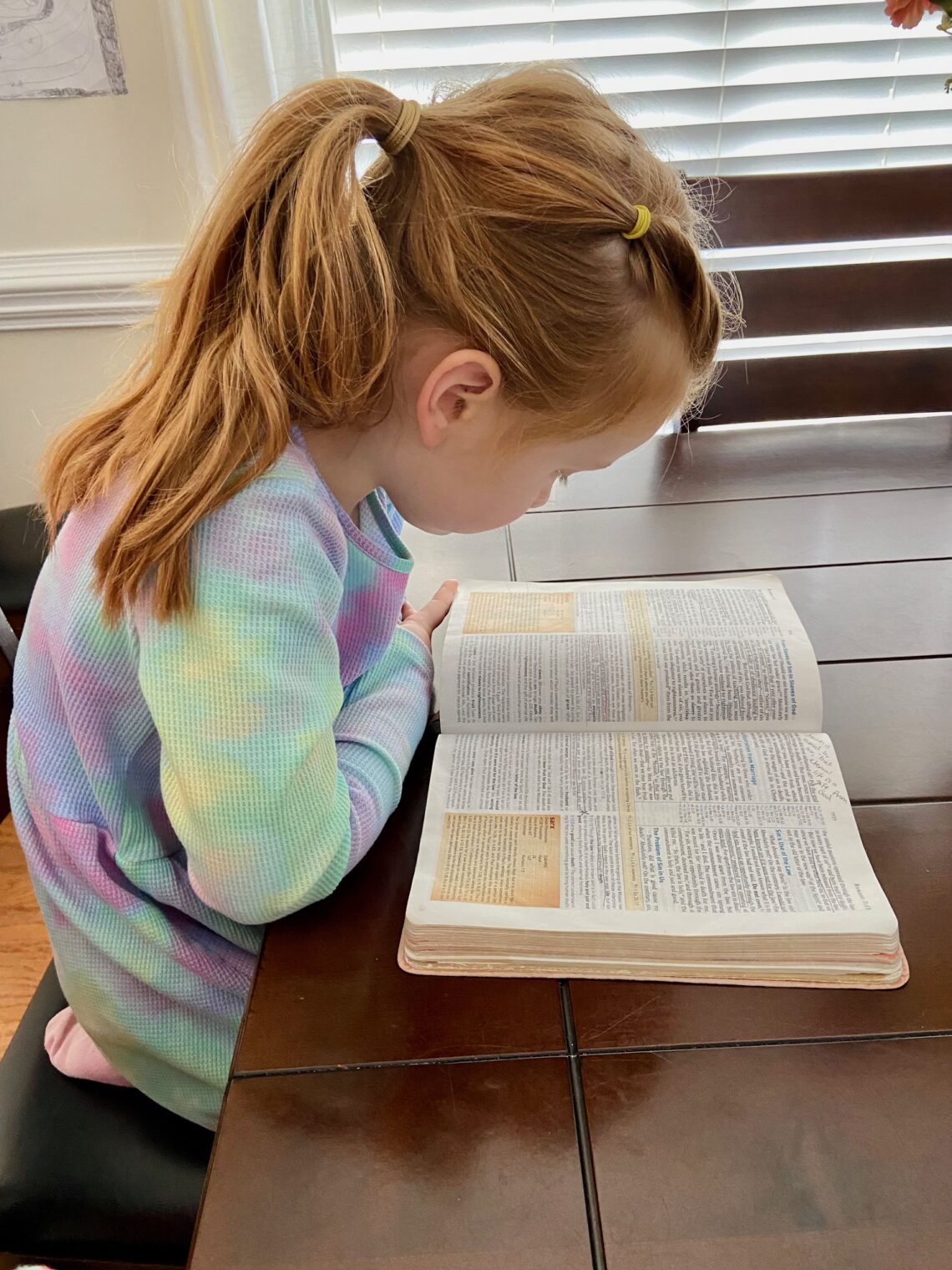
Helpful Tools To Teach The Bible To Your Kids
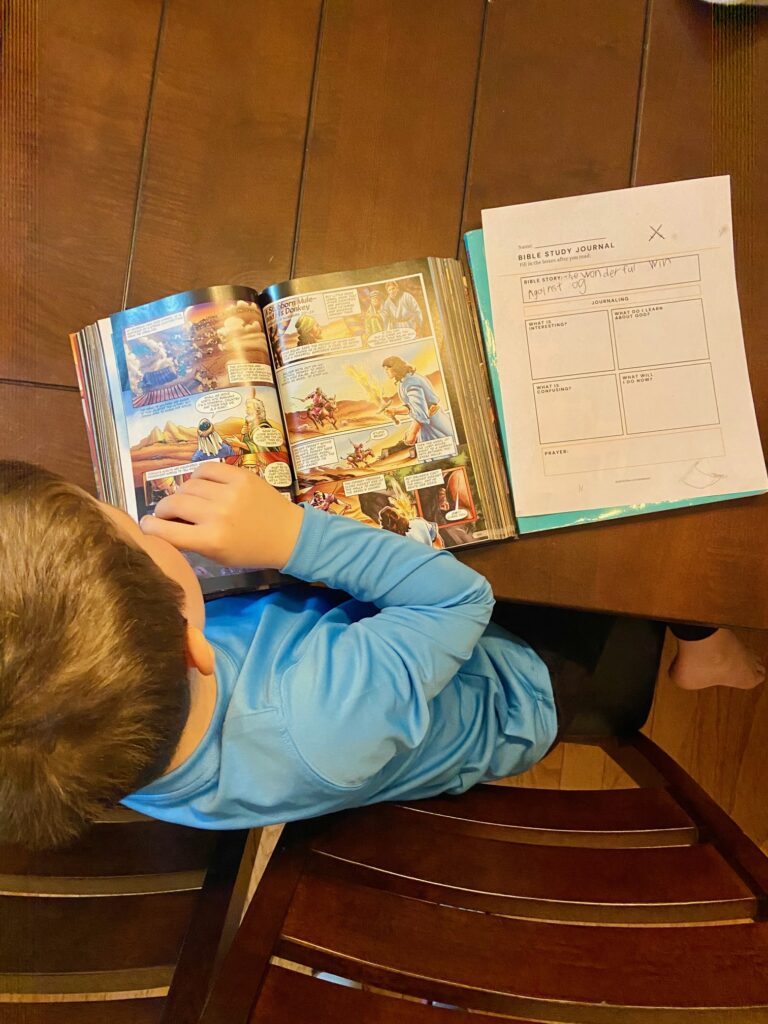
How I teach my kids the Bible has been a conversation I’ve had many times over the years with friends.
Teaching other women and discipling adults in the faith is something I’ve always been passionate about. But, I know that because I’m a Mama of four kiddos, one of the main callings of my life is to teach them the way of Jesus.
There are 2 primary avenues for teaching my kids about what it means to follow Jesus:
First is teaching them the truth from the Bible. Secondly, it’s showing them through my life, our home, and how we interact with others what it looks like to live those truths out.
This article focuses on discipling and teaching toddlers-elementary kiddos, simply because it’s the experience I have! At the end of this article, you’ll find a free Bible Study Outline I created for my 7-year-old son. I wanted to use it as a tool to teach him how to study the Bible critically. More than just consuming information about God, I also wanted to cultivate a love for the Lord in my son. I hope many of you will utilize it and that it will be a blessing to your family, too!
Why teach the Bible to your kids?
First, why is it important to teach the Bible to your kids? If you’re a parent, you know there are always more than enough tasks for each day. Why prioritize taking time to teach the Bible to your kids? Here are a few reasons:
1. To Know Truth:
I was talking with a friend who isn’t a Christian about what it’s like to follow Jesus. One of the main things I brought up was how we have an identity in Christ as believers. That you were made on purpose, for a purpose. That you are deeply loved by God and that He desires to have a relationship with you. There’s something about knowing objective truth that will grounds you. Without it, we’ll find ourselves drifting and floundering without anything to keep our lives on course.
Our kids must know the truths of scripture because it will guide and direct them for the rest of their lives. Like a map or the rudder of a ship, the truths of the Bible, the inspired word of God will carry them through the most confusing and difficult times of their life. It will be something to rely on when everything and everyone else seems less than steady or certain. When you teach the Bible to your kids, you’re instilling important truths in them. Things like who God is, who they are, and what their purpose is in life.
2. Knowing leads to loving and believing:
Knowing scripture leads to knowing God. It’s in the pages of the Bible that we learn who God is. We learn His character, His promises, and how He has cared for His people in the past and will continue to into eternity. It’s how we learn the meta-narrative of scripture and how the gospel is reflected from Genesis-Revelation. Spending our time and attention learning and meditating on scripture leads to a deeper knowledge and relationship with God. We teach the Bible to our kids to cultivate a love for God in their hearts and minds.
3. Knowing leads to living:
Knowing the Bible also helps us obey God and know how to live. We don’t learn scripture just for the sake of accumulating knowledge. We learn to be shaped into a person who lives and loves like Jesus. The Word forms us, by the power of the Holy Spirit, into the vision for humanity that God designed.
Toddler Bible Study Tips
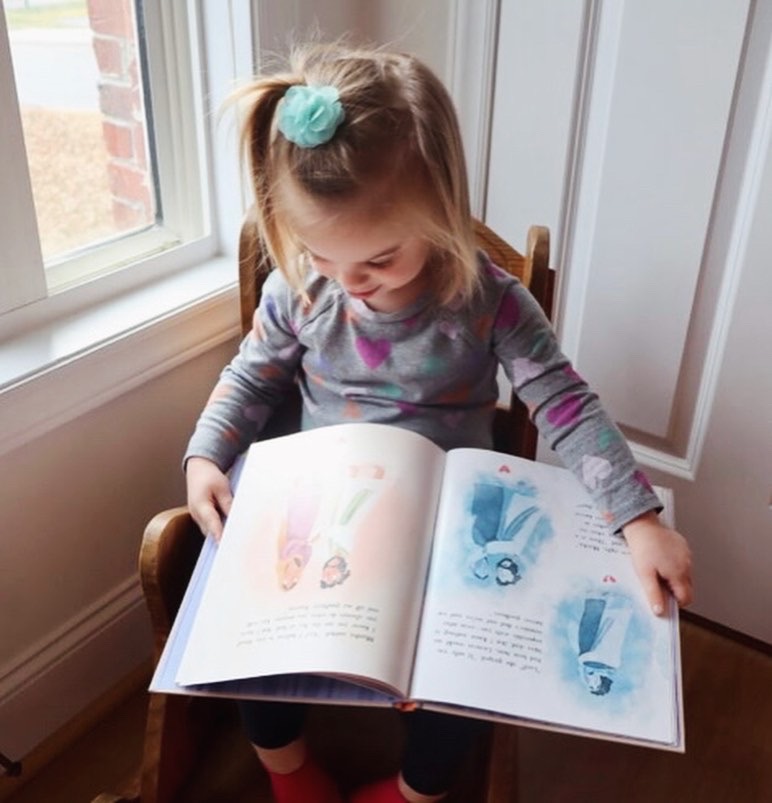
This can be a tricky age for parents to feel like much is being accomplished during Bible study time. Let me encourage you by saying that your kiddos at this age are absorbing and retaining so much more than you realize! Sometimes you won’t see the fruit of that until months or years down the road. (I’m sure Mamas with older kiddos than mine could attest even more so to this!)
I’ve told friends that each time you teach your kiddos about God, you’re making tiny deposits of truth that will build over time. This is where you lay the foundation on which children can build their faith in Christ. I still return to and reflect on the truths I learned in Sunday School as a child. Even the songs I sang when I was young. It’s amazing how God continues to use the investments people made in my life years ago.
Here are a few things to focus on to make the most out of our Bible Study time with toddlers:
1. Focus on identifying a single truth about God after your reading time:
Characteristics about God are revealed in scripture because the Bible is about who God is and what He has done. Keep it simple for this age group at the end of your time together. Remind them of one simple truth they can hold onto. Things like, “God created everyone and everything,” and “God always keeps His promises.” These are some examples of core truths that you can teach your children.
Keep the truths of church “catechisms” in mind when thinking about the one truth you want your child to know We have used New City Catechisms for Kids by Tim and Kathy Keller with our kiddos and I’ve used it as a resource to make sure my children have heard and know the core truths of our faith.
2. Keep your time short:
My sister is an elementary school teacher and she told me that the amount of time a child can pay attention is the number they are in years, translated to minutes. That means for a 3-year-old, an age-appropriate expectation for the time they can sit and pay attention is 3 minutes! Keep that in mind as you teach your toddlers the Bible.
3. Allow for movement:
Since sitting and paying attention for an extended time may be difficult for these kids, allow some movement while you read and talk! Use hand motions or actions to act out the story, allow them to color and listen while you’re ready, or even play with a quiet toy or activity while you read.
For example, when I teach in the toddler classes at church, I’ll frequently ask them questions and have them show me a thumbs up or down if the answer is yes or no to try to keep them engaged in the story. (Ie: “Is God good? Give me a thumbs up if you think He’s good.”) For boys especially, allowing them to quietly roll a car back and forth on the table or floor while you read can give them enough sensory input to maintain their attention a bit longer (can you tell my neuro PT self is coming to the table today? 🙂)
4. Use music to break up the time and amplify the fun:
For all young kiddos, anytime you can incorporate singing or songs into your time together, it’s sure to create a more positive and fun experience for everyone! We frequently use these playlists on YouTube with some of the songs we use from church.
5. Snacks on snacks:
Snacktime or mealtimes can be a great time to do Bible study and reading because it will likely increase the amount of time you can get your little one to stay tuned in as you read and discuss the Bible.
Preschool Bible Study Tips:
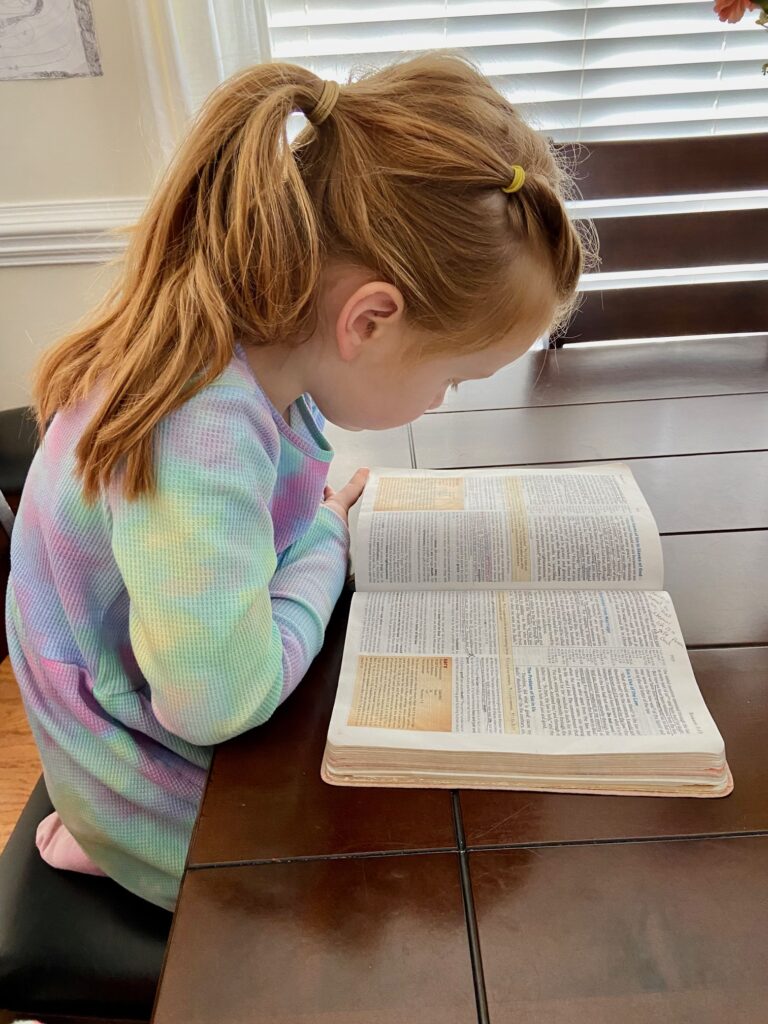
This is an age where I start to combine Biblical truth + questions about the text. At some point, we have to start teaching our kiddos to ask good questions and study the Bible critically for themselves. Truly, we want our kids to be critical thinkers in every area of life! But especially when it comes to our faith, we don’t want kids who just regurgitate information that has been told to them. We want them to ask questions, process information, be free to doubt, and wrestle with things in the Bible that don’t quite make sense to them so we can process things with them. This is what creates individuals who have a deep-rooted faith in Christ.
1. Identify what we learn about God in the story:
Every time I read with my kiddos I ask the question, “What do we learn about God from this story?” All scripture points to God and we can help our kids learn who God is by making this a focal point each time we study the Bible together.
2. What do you think about this story?:
This is a bit open-ended, but I’ve found that this age group can’t always answer more specific questions and this can be a great way to get the conversation going. If they have trouble answering, you can point out something in the story to guide them. “What did you think about when _____ happened?” “How do you think God’s people felt when _____ happened?” “Why do you think God did that?” Questions like these open up opportunities to share truth as you study together.
3. Draw the story as you read:
We’ve done this for my two older kiddos (preschool and elementary age) and this has been a great way to catch their perspective on the story and keep their attention as we read.
4. Point out the gospel connection in the story:
This can be great for all age groups, but every time you study the Bible together, connect the story to the gospel. How do we see the themes of deliverance and rescue in this story? How does this story point to Jesus, even if it’s in the Old Testament? Start connecting the dots of the overarching narrative of scripture for your kiddos.
Elementary Age Bible Study Tips
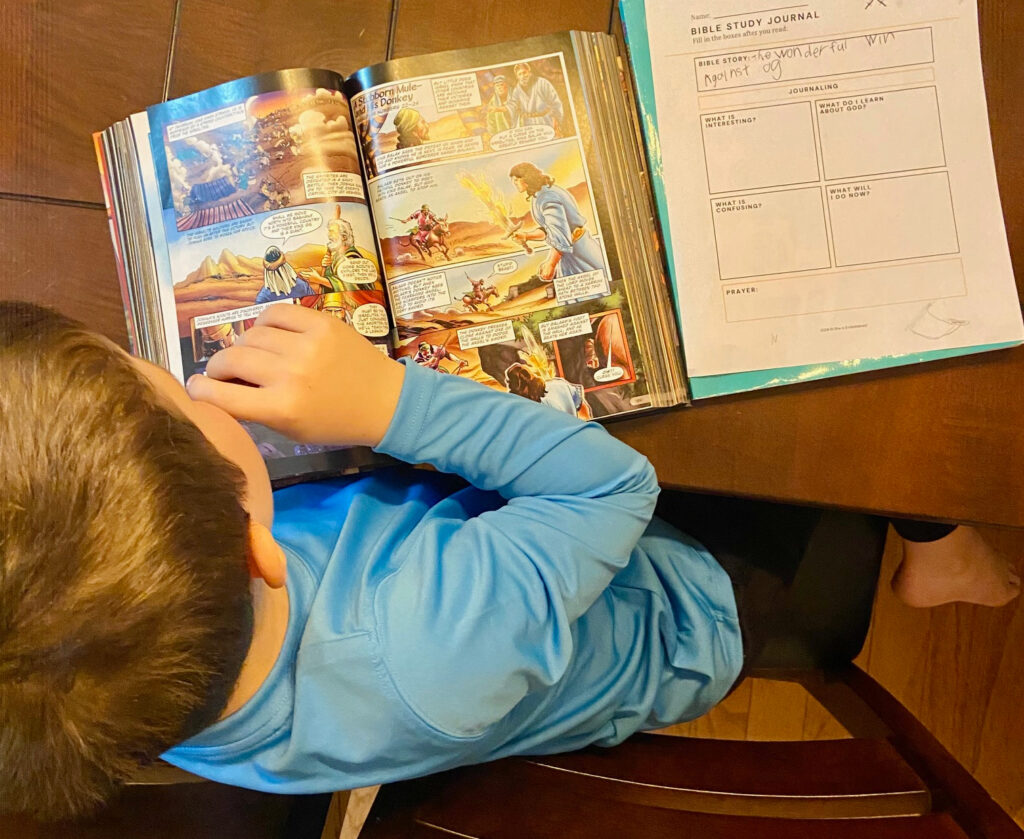
This is where we continue to build upon the knowledge and understanding of scripture and who God is that we have laid in the previous age groups. My goal for my elementary-aged child is to cultivate a love for scripture in their heart, create routines of independent time in the Word, teach them to ask questions and think critically when studying the text, and for them to understand and connect the dots of the themes of scripture throughout the Bible.
1. Get a Bible they can be interested in:
It seems like there is an abundance of Bibles for young children, but a bit of a gap for elementary-aged kiddos until they are ready to use a Bible that you and I use. Our 7-year-old son has loved the Action Bible that was recommended to us by a friend. I like that it has many more stories of scripture than children’s Bibles and it’s designed in “comic book” form, which truly keeps his attention! While this may seem like something that boys would be more interested in, my friend who has an elementary-aged daughter said that she also loves this Bible! I have heard good things about Kaleidoscope Bibles for elementary and middle school-aged kiddos and plan to look into those soon.
2. Use an outline to study and discuss scripture:
Once my son hit first grade, I realized he was probably ready to try to utilize an outline on his own. Our new routine in the last several months is for him to read a story in his Bible, fill out the Bible Study outline sheet I made for him, and discuss what he reads with us. There are still many opportunities to add to his observations and points for further discussion, but this exercise of inductive Bible study and learning to dig into scripture for himself has been a huge point of growth for him lately. It’s amazing how the Holy Spirit can guide our kiddos into truth and reveal to them the truth in scripture!
3. Develop a daily Bible reading routine:
Just like adults are more likely to spend time with the Lord when they have a routine, kids are the same way. After watching my husband and I sip coffee and read our Bibles in the morning, our son has adopted a similar routine. He got a special coffee mug from his grandparents, drinks his “coffee” (aka 1% coffee, 99% milk), and sits and reads his Bible each morning.
After years of initiating reading the Bible with him in the morning and watching us spend time with the Lord in the morning, he now initiates reading the Bible on his own. I know the Lord has cultivated a love for the Word in him, but I also know that most things are “caught, not taught,” The more we can help our kiddos develop their relationship with the Lord, the more likely they are to stand on their own two feet when they leave our homes.
4. Discuss counter-narratives to the Bible and Christianity:
One easy way to do this is to identify times in the Bible when people rebel against God. Point out to your kids how those who aren’t believers may think differently about these things. At the same time, cultivate a love for those outside the church. I think the tension of adhering to the truths of Christianity while simultaneously loving those who don’t have faith in Jesus is an essential call the Lord has given us.
Our kids need to understand that the world will have a different perspective on things like marriage, love, and values than we do as Christians. They also need to understand that God loves people who are far from Him and that He is pursuing them. We are called to do the same thing as followers of Jesus.
At the end of the day, my main advice for teaching your kiddos the Bible would be summarized as this: Spend time with your kids, cultivate a culture of open conversation, and live out your faith in front of your children.
They need to see you clinging to the truths of who God is and the promises of scripture when life falls apart. To see you turning to Him when you’re struggling.
They need to see you loving those who are far from God in your life. Your kids need to hear your stories of when you’ve wrestled with God and come out on the other side. They need to see a love for Christ in you. Don’t be afraid to live out an authentic faith in front of your kiddos.
Resources To Help Teach The Bible To Your Kids
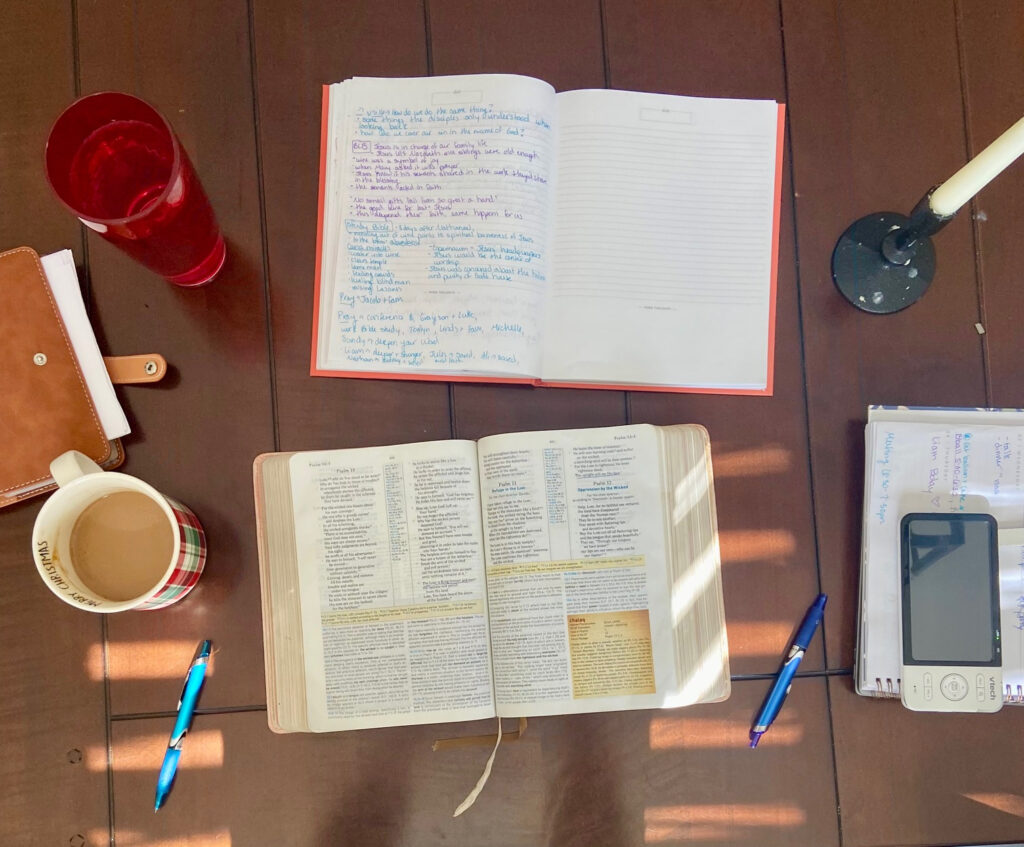
I didn’t want to leave you hanging after all of that information, so here are our favorite Bibles, books, and tools to teach your kids the Bible. I also included the outline I have been using with my son for you to use with your elementary-aged kiddos as you study the Bible together!
Free Bible Study Outline Printable: I made this for my 7-year-old to help him study the Bible more independently.
Bibles for Toddlers and Preschoolers:
The Beginner’s Gospel Story Bible
Bible Stories Every Child Should Know
Bibles for Elementary-Aged Kids:
Other Resources:
Want more resources for parenting?
Check out all our articles on parenting HERE.
About The Author

Jen is the founder of SIE and a Mama to 4 young kiddos. She has been married to her husband Jonny for 10 years and they currently reside in Winston-Salem, North Carolina. Jen and Jonny are actively involved in their local church as small group leaders and have a heart for discipling others as they follow Jesus. Interested in having Jen write or speak for your organization? Email her at jen@sheisemboldened.com.
Let’s Connect!
Fill out the form below to get exclusive theology chats and SIE resources. My email list friends always get the best that SIE has to offer!
Follow Us On Social
Come say hello and follow along on social media for more SIE content!




